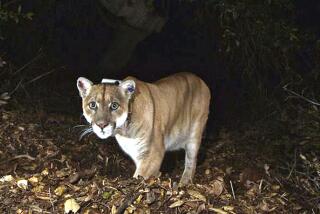Arizona Congressman to Propose Conservation Area
- Share via
PHOENIX — An Arizona congressman is proposing creation of a wildlife and recreation corridor linking mountain ranges and national forests that stretch across 200,000 acres of the state.
Las Cienegas National Conservation Area would run from the Mexican border to just southeast of Tucson, taking in a mix of grassland, caves, springs and more than 600 archeological sites.
Cienega Creek, whose watershed provides water for metropolitan Tucson, runs through it.
Rep. Jim Kolbe (R-Ariz.), who is preparing the legislation to create the conservation corridor, is declining to discuss the proposal. He had planned to announce it at a news conference on Saturday.
Jesse Juen, field manager of the U.S. Bureau of Land Management office in Tucson, said the idea is to create “a protective umbrella” so the land is managed with common goals and isn’t split up.
“These same areas are probably future hot spots for development,” he said.
A quarter of the land is federally owned and overseen by the BLM. Half is state trust land and a quarter is private.
A recent draft of the bill would forbid the federal government to buy any private land in the conservation area. Exchanges and donations would be allowed, as would the purchase of development rights on property, leaving the land in private hands.
Conservation advocates are applauding the proposal.
“This is important as open space, wildlife habitat and preserving a little bit of the West as the West should be,” said Kevin Dahl, executive director of the Tucson Audubon Society.
Critics, however, dismiss the proposal as “a paper park” that sounds impressive while accomplishing nothing.
Peter Galvin, of the Center for Biological Diversity in Tucson, said he is troubled that Kolbe’s draft bill allows grazing within the boundaries of the conservation area.
The center has fought to kick cattle off public land, arguing that overgrazing has destroyed the grasslands.
However, the bill doesn’t give carte blanche to ranchers. It calls for environmentally responsible and sustainable livestock uses.
Galvin also wants Kolbe to ban mining within the boundaries “so we aren’t faced with giant open-pit mines tearing up a conservation area.”
Without those kinds of steps, Galvin wonders: “To what extent is this conservation area just going to exist on paper? What is going to change out there?”
More to Read
Sign up for Essential California
The most important California stories and recommendations in your inbox every morning.
You may occasionally receive promotional content from the Los Angeles Times.










